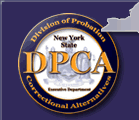

What is Probation? |
|
Introduction |
|
The primary function of the Clinton County Department of Probation/ATI is to maintain community safety while supervising offenders sentenced to probation supervision in the community setting. Although there is a large assortment of programs and services offered by the Probation Department, an awareness of our basic objectives under the law is essential to understanding the importance of our role in the Criminal Justice System. | |
Reports to the Courts |
|
One significant component of the Probation Department’s involvement with the Criminal Justice System is investigating and preparing reports for the Court(s). The New York State Criminal Procedure Law authorizes the Probation Department to conduct an investigation and prepare a pre-sentence report for Criminal Court prior to the sentencing of the offender. Although the law provides for the waiving of the report in certain circumstances, we prepare approximately 600 Criminal Court reports each year for Clinton County Court, Plattsburgh City Court, and the twenty-eight Justice Courts within Clinton County. Similarly, the Family Court Act also authorizes the preparation of a pre-dispositional report prior to a final disposition in cases involving Juvenile Delinquents (JD) and Persons in Need of Supervision (PINS). |
|
Information that is included in these reports is identifying personal data, past criminal history, description of the offense, delinquency and/or ungovernable behavior, social circumstances including family situation and environment, education, employment, physical and mental health, and drug/alcohol abuse history. The report evaluates and synthesizes relevant information from the investigation to provide the Court with succinct and accurate information and analysis for informed judicial decision making. The probation officer considers the full range of community and institutional resources and programs, impact on the victim, and their applicability in any recommendations made to the Court. |
|
Probation Supervision |
|
The original concept of probation supervision was originally developed in 1841 in Boston, Massachusetts by John Augustus, a shoemaker who was interested in helping offenders who were before the Court for alcohol-related offenses. He would “supervise” the offenders for the early Court system. Probation supervision has evolved into much more than a means to allow the offender the opportunity to be under a period of supervision in lieu of a term of imprisonment since its inception in the nineteenth century.
|
|
The current objectives of probation supervision in Clinton County are to assist probationers in altering their lifestyles to become law-abiding, productive citizens in the community while protecting community safety. This is accomplished by developing a specialized supervision plan that is specific to the individual needs of each probationer. It is geared to be completed by the end of the Court ordered supervision period, which is generally one, three, or five years in duration, or six or ten years for sexual offenders. Such a program could include specific terms of probation ordered by the Court that pertain to alcohol and/or drug abuse testing and counseling; education and/or employment requirements; mental health evaluation and counseling; and any other conditions that are tailored to the specific needs of the probationer. A probation sentence also allows time for the offender to make restitution to the victim(s) and pay Court ordered fines and/or surcharges.
|
|
The sentencing Court may combine an initial sentence of incarceration in the Clinton County Jail with a term of probation. The offender may also serve an intermittent jail sentence (not in excess of four months), which runs concurrently with the term of probation.
|
|
All offenders sentenced to a term of probation are required to report to their probation officer at the Probation Department on a regular basis. The frequency of these office contacts is determined by the probation officer according to the probationer’s individual risks and needs, as is determined by the use of a risk and needs assessment tool. There is also a strong emphasis placed on field work and home visits. The probation officer makes additional regular contacts throughout the supervision period with family members, employers, schools, caseworkers, and other counselors working with the probationer.
|
|
If the probationer fails to comply with the terms and conditions imposed by the Court, there are a variety of measures which may be considered, ranging from an internal Administrative Reprimand with graduated sanctions to a formal Violation of Probation petition filed with the Court. If found guilty of the violation, this could result in the probation sentence being revoked and a sentence of incarceration imposed.
|
|
If supervision goals have been successfully completed and the Probation Department feels that an early termination of the probation sentence would not be contrary to the goal of protecting the safety of the community, the probationer may be recommended for early discharge from probation prior to the maximum expiration date of the probation sentence. The ultimate decision for early discharge lies with the sentencing judge.
|
|
Additional Links |
||
|
American Probation & Parole Association
NYS Probation Officer’s Association
|









